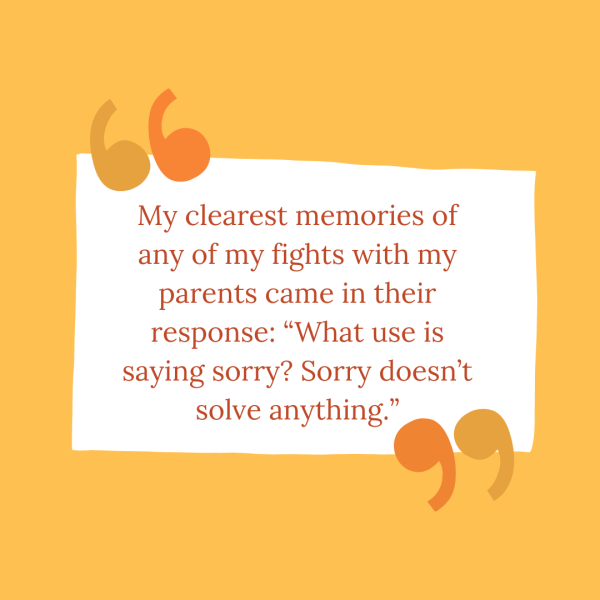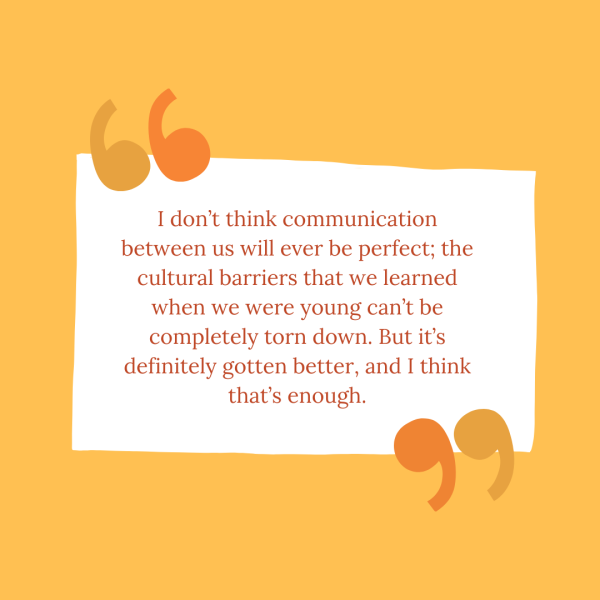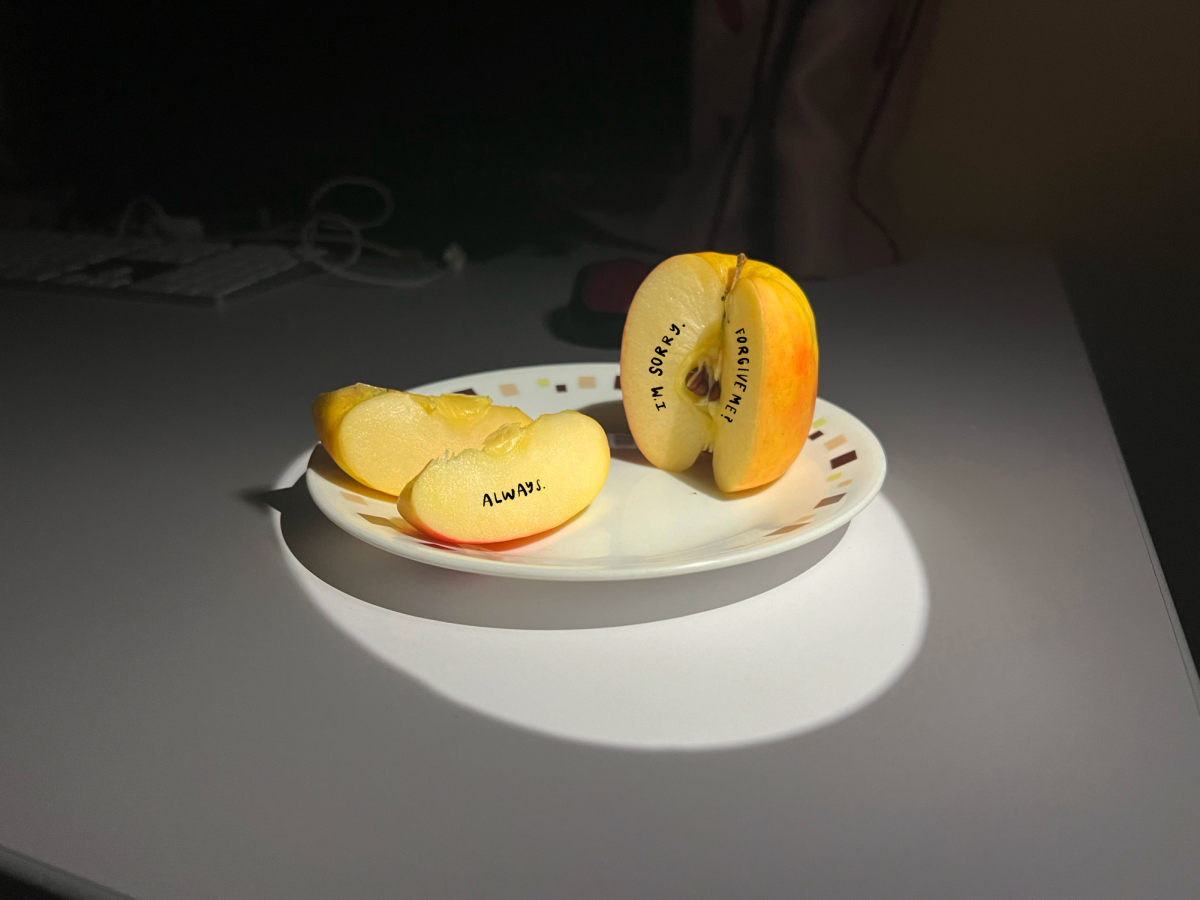A plate of cut fruit — watermelon and mango in the summer because it’s in season, asian pear in the winter because it’s good for sore throats and coughs — complete with a fork and a napkin, set wordlessly on the table next to me, no sound except the clinking of the plate on the table and the click of the door shutting as my mom leaves my room; a scene just about any kid with Chinese immigrant parents can relate to. It’s a sign of something Asian parents have perfected: the art of saying sorry without the words ever leaving their mouths. Or even more broadly, the ability to broadcast their love without the accompanying phrases.
Food is something I’ve always associated with my parents’ love more than the words “I love you.” Especially when I was younger, my parents never really apologized to me or told me I was forgiven in words when they’d gotten angry with me. Instead, I’d be able to tell through the food they put on the table: if my parents went through the effort to make fresh stir-fry instead of microwaving yesterday’s leftovers, I’d know they couldn’t be that mad. It was something I grew up knowing.
 But when I started going to school, I was taught to say phrases like “I’m sorry” when I’d hurt someone, and “I forgive you” when we’d made up. And as social convention dictates, I’d say it at home as well. I wasn’t a particularly combative kid, immediately seeking my parents’ forgiveness if I’d done something wrong, but I was also feisty enough to get in trouble fairly easily, so the words “I’m sorry” were a common part of my vocabulary. Yet, my clearest memories of any of my fights with my parents came in their response: “What use is saying sorry? Sorry doesn’t solve anything.”
But when I started going to school, I was taught to say phrases like “I’m sorry” when I’d hurt someone, and “I forgive you” when we’d made up. And as social convention dictates, I’d say it at home as well. I wasn’t a particularly combative kid, immediately seeking my parents’ forgiveness if I’d done something wrong, but I was also feisty enough to get in trouble fairly easily, so the words “I’m sorry” were a common part of my vocabulary. Yet, my clearest memories of any of my fights with my parents came in their response: “What use is saying sorry? Sorry doesn’t solve anything.”
And I think that brings me to the crux of the problem: my parents and I have two fundamentally different ways of communicating. Being brought up in today’s day and age means that I’ve gone through 12 years of schooling on the importance of language, on clear communication, not to mention my years spent doing journalism and speech. From something as simple as being able to say the words in an apology, to understanding why I shouldn’t use words like the n-word or the r-word, I have been taught that words have power and should be wielded carefully.
On the other hand, my parents both grew up in relative poverty in China, where words never correlated with action. Pretty words wouldn’t put food on the table. Of course, there’s also the issue of Chinese filial piety (reverence for one’s parents) and the fact that all good Chinese children should respect what their parents say, though it wasn’t always true the other way around. Either way, words meant little to my parents; they needed to see action.
Consequently, when I got old enough to feel like I could argue back, the fights between my parents and me were explosive, to say the least. My parents always felt like I was making empty promises or making excuses for my actions — sure, I could say that I was going to do my project on time next time, but they hadn’t seen me doing any homework to support that statement. On my end, I felt like my parents were never listening to me. I was already telling them what I was going to do, and if they couldn’t trust what I was telling them, then that was their fault and not mine.
At that point, cut fruit never felt like enough of an apology for me. There were definitely times when I was in the wrong in our arguments, but more often than not, I could recognize this after we’d cooled down and then I’d apologize. But when I felt my parents were in the wrong, they’d never apologize to me. I had to guess when I’d earned their forgiveness. Although the arguments would always resolve themselves eventually, they left a bad taste in my mouth.
One day, after a particularly bad fight, I was lying on my bed stewing in my anger over my parents being insensitive, when something suddenly occurred to me. I’d always prided myself on communication, seeing myself as the “bigger person” for apologizing first. But had I ever made the effort to tell my parents that I wanted them to apologize to me as well? It felt obvious to me that they should do that without prompting, but maybe it wasn’t.
After that, I started making more of a conscious effort to explain to my parents my thoughts. And it was much harder than it seemed — after all, anyone can say “Just talk to your parents,” but it felt extremely awkward bringing up the idea of saying the measly words of apology after we’d just spent the last 10 minutes hurling insults at one another. I had conversations about this barrier in communication with them in so many bits and pieces that I can’t even pinpoint a specific memory or the pivotal moments that brought me to now.
All I know is that over the course of my high school years, it’s somehow gotten better. Maybe it’s a factor in my coming to understand my parents better, and maybe it’s due to my fumbled communication attempts with my parents. Whatever it is, my parents are much better at actually articulating what they feel. They still definitely don’t say “I’m sorry” half as much as I do for them, but I’ve learned to live with it. After all, they compromised with me — the least I can do is compromise for them as well.
I don’t think communication between us will ever be perfect; the cultural barriers that we learned when we were young can’t be completely torn down. But it’s definitely gotten better, and I think that’s enough. I’m glad every time they’re able to articulate “I’m sorry” to me — and if sometimes it’s just a plate of cut fruit, it’s no longer a hardship to accept that either.










